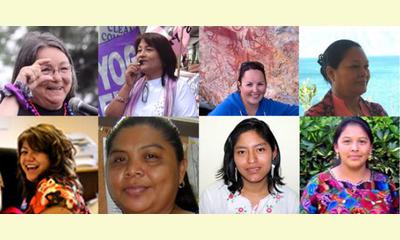|
|
Indigenous women from Canada and the Global South unite at the UN Permanent Forum on Indigenous Rights
un articulo por Kairos Canada (abridged)
Canadian Indigenous leaders will join their counterparts from Guatemala, the Philippines, Nicaragua and Panama for the Honouring Indigenous Women’s delegation to the 13th UN Permanent Forum on Indigenous Issues (UNPFII), May 19-23 to deepen the understanding of the impacts of the resource extractive industry on Indigenous women, and call on countries to fully implement the UN Declaration on the Rights of Indigenous Peoples.

KAIROS' Honouring Women's Wisdom/UNPFII delegates
click on photo to enlarge
The joint KAIROS Canada and Horizons of Friendship delegation will highlight Indigenous women’s leadership in protecting the environment and defending collective rights, including the right to Free, Prior, Informed Consent (FPIC), in relation to mining operations in their communities. Indigenous women’s leadership is essential in ensuring the implementation of the UN Declaration on the Rights of Indigenous Peoples because of the important role they play in their communities. . .
“UN reports are beginning to link increased mining activity to increased violence against Indigenous women and girls,” says Jennifer Henry of Kairos. “We expect to hear directly about examples of repression of women by private and public security forces at the site of mining operations. We anticipate testimony of women on the detrimental impact of large influxes of male labour at resource extraction sites.”
“It is vital to support and recognise the essential role that Indigenous women play in defending their communities’ rights,” states Patricia Rebolledo, Executive Director of Horizons of Friendship. “This delegation will allow Indigenous women to share and learn from each other’s experiences, as well as support grassroots leaders to engage with these issues at the international level.”
The Honouring Indigenous Women’s delegation will include an official UNPFII side event entitled, From Canada to Guatemala to the Philippines: Honouring Indigenous Women’s Wisdom on May 21st at the Dag Hammarskjold Library Auditorium at UN Headquarters. . .
The KAIROS Canada and Horizons of Friendship delegation launches what is anticipated to be a long-term partnership between these organizations to spotlight the impacts of resource extraction on the rights of Indigenous women worldwide.
This year the UNPFII will focus on the principles of good governance in relation to the United Nations Declaration on the Rights of Indigenous Peoples, and in particular the articles which refer explicitly to the rights of Indigenous peoples to self-determination and to freely pursue economic, social and cultural development. This is widely understood as the right of Indigenous peoples to participate, and ultimately decide upon the development models that will impact their communities.
KAIROS Canada is a social justice organization of eleven Canadian churches and religious organizations. It focuses on Indigenous rights, international human rights and ecological justice. KAIROS deliberates on issues of common concern, advocates for social change and joins with people of faith and goodwill in action for social transformation.
Horizons of Friendship has more than 40 years of experience building partnerships in Central America and Mexico. Its strategy for creating change is to ensure that grassroots civil society organizations in the region have the resources and capacity needed to address priority issues and make social and economic change happen.
[Thanks to Janet Hudgins, the CPNN reporter for this article.]
|








|
DISCUSSION
Pregunta(s) relacionada(s) al artículo :
Do women have a special role to play in sustainable development?,
* * * * *
Comentario más reciente:
:
This discussion question applies to the following articles:
Dublin: Women central to sustainable future development
Calling women: Why women and technology are a perfect pairing
Indigenous women from Canada and the Global South unite at the UN Permanent Forum on Indigenous Rights
Mothers Light Up Homes in Rural Tanzania
Bali summit: Are women our best hope for fighting climate change?
U.N. Climate Talks Advance Link Between Gender and Climate Change
Women Revolutionise Waste Management on Nicaraguan Island
On remote Philippine island, female forest rangers are a force to be reckoned with

|
|









